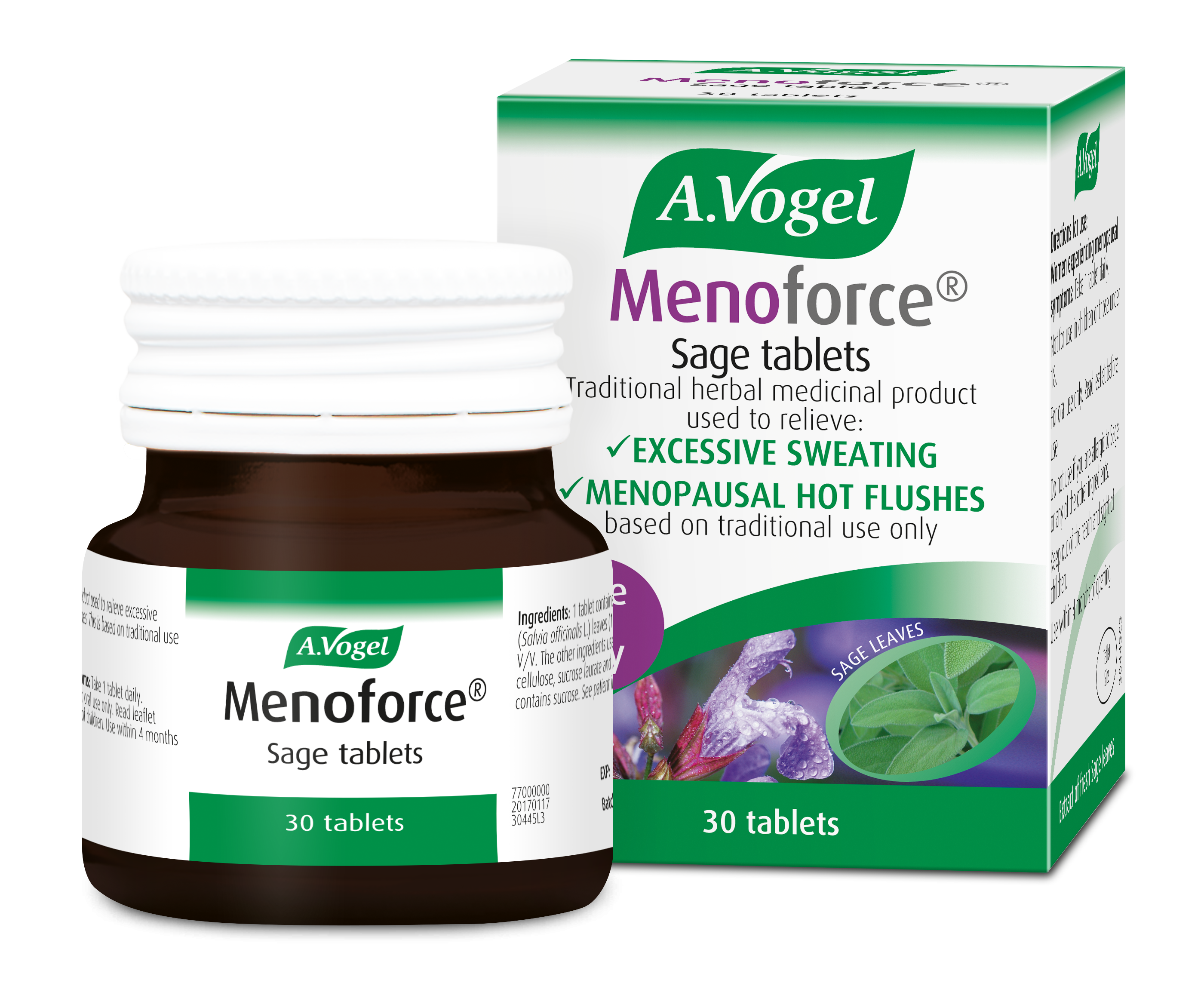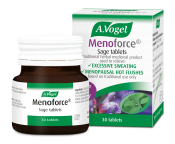Read the full video transcript below
Today's topic
Hello, and welcome to my weekly video blog. And today on A.Vogel Talks Menopause, I’m going to be talking about those dreaded hot flushes and night sweats. Now, just something to remember, although hot flushes and night sweats are the number one symptom for the perimenopause and the menopause, not every woman will experience them. About 25% of women going through the menopause will never have a hot flush, so it’s not a done deed that every single one of you is going to them. So just keep that in mind. What I’m going to do is I’m actually going to talk about hot flushes and night sweats separately because there are several different things you can do for each one.
Hot flushes
Let’s look at the hot flushes first. What’s causing them? Well, it’s the falling oestrogen. And they have actually found that falling oestrogen can affect a gland in the brain called the hypothalamus. And one of the things that the hypothalamus does is regulate your temperature control. Now, it’s a little bit like your central heating thermostat that you have on the wall, or in one of those little boxes around the house. And what happens is that when the oestrogen falls, it makes the hypothalamus go a bit wonky. Now, one of the mechanisms that your body uses to lose heat when you’re too hot is to flush the skin with blood so that you sweat, and that actually cools you down.
So if you’re getting a hot flush, what’s actually happening is that the hypothalamus is going, “It’s too hot in here. I need to cool things down.” So it very quickly sends a rush of blood to the skin, and that then starts to cool you down. But the problem is that in the process of flushing, it can make you very, very hot. It can make you sweat. It can make you go bright red, and it can cause an awful lot of discomfort. So what we need to do is look at ways of helping to calm the flushing down, but also maybe just to reregulate that thermostat, just to see if that helps.
Other causes of hot flushes
Now, there are other causes of the flushes, as well. It’s not just hormonal. And the problem is that we’re in an age where, as women, we’re very, very busy during the day. We can get lots of anxiety and stress just from day-to-day life. And remember that the menopause itself, all the internal changes that are going on will stress your nervous system.
So if you combine these two, then your nervous system gets overwhelmed. It gets more and more sensitive to everything. And lots of little things can actually then trigger the nervous system, which then can trigger a rush of adrenaline or histamine and that, in turn, then triggers the flush. And it’s sometimes difficult to distinguish whether it’s the hypothalamus going wonky, or whether it’s other issues in the menopause that are causing the problem.
So the things that can cause hot flushes would be stress and anxiety, generally. So you may find that you suddenly start worrying about something, or you kind of go, “I can’t find my car keys,” or somebody upsets you. And that in itself can be enough to trigger the nervous system, and you’ll find you’ll then get a hot flush.
Dehydration can do it. And this is a really huge issue with flushes. The minute you get a hot flush, even though you might not realize it, you will be losing perspiration from the skin, and that can very quickly dehydrate you. Dehydration will also stress the nervous system. So you have a hot flush, you get dehydrated. The dehydrated triggers the nervous system, the nervous system gives you another flush, and so on. And it can become a real vicious circle here.
Other things can do it, like coffee, alcohol, processed foods, high-salt foods, even a bag of crisps sometimes can give women a hot flush. High-sugar foods like chocolate, and also be wary of artificial sweetness because some women find that they can actually trigger flushes, as well.
How can you help yourself?
Now, there are a couple of things that you can do here to look and help with the hot flushes. I always recommend doing a diary, writing things down is great. So maybe look at that, so when you get a hot flush, maybe write down the time, and then look back a couple of hours and see what was happening. Did you have a strong cup of coffee? Did you have an extra cup of coffee? Did you have a piece of cake? Did somebody upset you? Were you rushing around like an idiot? All these things might give you a clue as to what actually caused the flush itself.
Now, if you’re looking at herbs and supplements, sage is the remedy that we always start with. And nature is actually wonderful, because if you look at a sage plant in hot weather and in the sunshine, you can actually see little beads of moisture on the leaf. So we know that sage can be very helpful and tends to work very quickly for hot flushes.
A.Vogel Menoforce Sage Tablets for Menopausal Hot Flushes and Night Sweats, One-a-Day, 30 tablets
£15.99 (30 tablets) In Stock
If anxiety and stress is an issue, then go for herbs like Avena sativa, or passion flower. Remember the magnesium, as well, because that’s a really, really important one for all issues of the menopause. And do some deep breathing. It’s amazing how doing deep breathing calms the nervous system. And a lot of women find if they really get to grips with the deep breathing, it can actually hit a hot flush on the head or it can, at least, make it not so severe.
The other thing that can cause stress, which can have an effect on flushes, is when you actually get a flush, especially if it’s in public, and it’s in front of other people or your colleagues. The minute you feel a flush coming on, you start to panic because you’re going, “Oh, no. I’m having a flush. Everybody is going to see. I’m so embarrassed.” The minute you do that intake a breath, your nervous system is ramped up even more. And that can prolong the hot flush.
So one of the little tips I say to women is, the next time you’re at home and you feel a hot flush coming on, stand in front of the mirror and actually see what’s going on. And you might be quite surprised that it doesn’t actually look as bad as what you think it does. And that will give you control the next time you start to have a flush in front of other people.
Night sweats
Now, night sweats. There can be a variety of causes for night sweats, as well. We’re busy people, as I’ve said before. We hardly get a minute’s peace, a minute’s rest. And that constant stress and busyness during the day can rev up and overwind our nervous system.
Can't sleep
So you might find that you can get to sleep all right. Suddenly, in the middle of the night, you’re waking up, your heart’s thumping, you’re drenching with sweat, then you get cold because, remember, sweating cools you down. So you sweat, you then get chilled, you then get back into bed, you then get another hot flush. So this, again, can be another vicious circle. So dealing with stress during the day is very important for the night time sweats. But what we have realized is that poor sleep will affect your nervous system the next day.
So if you’re getting disrupted sleep through sweats, and you’re waking up and down all during the night, you will wake up tired. Your nervous system will be stressed before you start the day. And that, in turn, will make you more prone to hot flushes and other menopause symptoms during the day.
How can you help yourself?
So with night sweats, the most important thing is to get a good night’s sleep in whatever way you can. Again, we would suggest sage, but you would take it…if it’s tablets, you would take it with your evening meal. If you decide to take the tincture, you can take that about half an hour before you go to bed.
If anxiety is the big issue, if you find you can’t actually drop off to sleep, then a magnesium supplement with your evening meal can help to just calm everything down, and you can also look at a combination of valerian and hops because these two can really help to get you off to sleep and to actually keep you asleep, as well.
Other issues
One of the other issues with nighttime is, especially if you wake up between 2 and 3 o’clock in the morning, is the fact that that may indicate your liver is a bit stressed. Now, this is nothing serious. Don’t worry. But the menopause itself, the hormonal changes, the digestive changes that are going on, can actually stress your liver. And what happens is your liver, like the nervous system, gets overwhelmed. And 2 and 3 o’clock in the middle of the night is normally when the liver works at its peak.
So, very often, it’s revved up at that point trying to cope with everything, and that will wake you up. So, if that’s you, then a combination of herbs such as milk thistle, and peppermint, and dandelion, and Cynara can all help to improve liver function.
And I actually had a lady today who emailed me to say that she found the milk thistle had helped her hot flushes during the day. So supporting the liver can be beneficial for a whole range of menopause symptoms, as well. The other really important thing, if you’re sweating a lot at night, you can actually wake up dehydrated before you’ve even got out of bed. And if you find that you’re getting a lot of anxiety as you wake up, that could be due to the nighttime dehydration. So taking a small glass of warm water before you go to bed can often help to delay that and stop that, as well. So remember to do that.
Acupuncture & deep breathing
The other things that you can do for hot flushes and night sweats, especially if your nervous system is involved is acupuncture. It can be very effective, so it’s certainly worth looking into. The other things would be the deep breathing, as well.
This week's homework
So I hope that this has helped a little bit. There’s so many issues associated with hot flushes, and I could literally probably talk for about two hours on this just to actually cover everything. So this is just a little glimpse into the sorts of main things that can contribute to hot flushes and night sweats.
Now, for this week, I’ve got quite a lot of things that I would like you to try.
Remember the water, because dehydration is a big part in flushes. Get that water intake up. For those of you that have been doing it for a few weeks, you should be on at least three to four glasses of water a day now.
Remember to do the diary. Try that. That might give you information as to what in your life is triggering your hot flushes, and then you can deal with them. And that will give you more control over what’s going on.
Have a look in the mirror and remember the deep breathing, as well.
So let me know how you get on, and I’ll look forward to seeing you next week on A.Vogel Talks Menopause.









